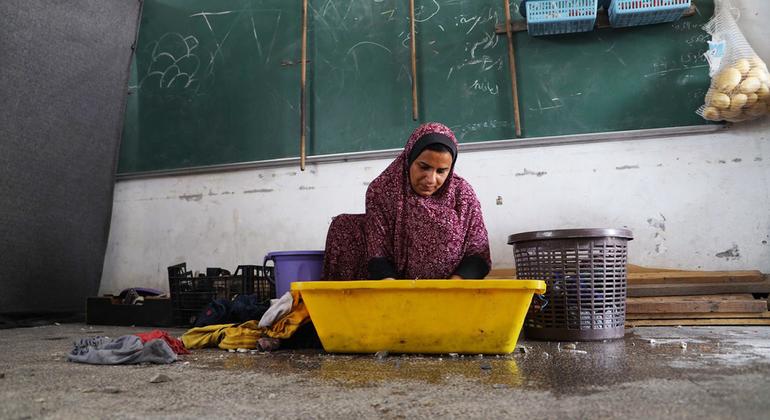Speaking to reporters in New York, UN deputy spokesman Farhan Haq said the agency providing assistance to Palestinian refugees, UNRWA, estimated that only 65,000 people remained in Rafah – a significant drop from six weeks ago, when the southern city was hosting 1.4 million displaced people, before Israel's evacuation orders and military operations began.
“UNRWA also reports that 625,000 children have been out of school for more than eight months,” Haq said.
Meanwhile, OCHA reports that five trucks loaded with fuel have entered the Gaza Strip for the first time since early June, but supplies remain scarce as no fuel has been delivered to the Strip for the past two weeks.
Women-led organisations in Gaza an 'inspiration'
And in an exclusive interview with UN News, the UN Women's Special Representative in the Occupied Palestinian Territory said the tenacity of women-led organisations working across Gaza for the benefit of their communities is “an inspiration”.
Maryse Guimond, from the UN agency promoting gender equality in Palestine, spoke about its first mission to the war-torn area before the fighting began, explaining how they were working with other agencies to deliver food, dignity kits, psychosocial support and other supplies.
She said women-run organisations supported by UN Women are “key responders”, many of whom have been displaced multiple times during the ongoing conflict.
60% increase in displacement across Haiti: IOM
Some 580,000 people are now internally displaced across Haiti, a 60 percent increase since March, the United Nations International Organization for Migration (IOM) said Wednesday.
In addition to displacement in and around the capital, Port-au-Prince, gang violence is driving unprecedented numbers of people to flee to neighboring provinces.
As a result, the number of internally displaced men, women and children in the south has increased from 116,000 to 270,000 in just the past three months.
Most of the displaced people now live in communities struggling with already overwhelmed social services and poor infrastructure.
The IOM said the damage was particularly severe in the country's southern regions, which were already weakened by the 2021 earthquake.
In the Port-au-Prince metropolitan area, two-thirds of displaced people live in spontaneous settlements with very limited access to basic services.
IOM has provided nearly 5 million litres of clean water to about 25,000 people and rehabilitated 22 manual water pumps.
More than 37,000 people have been provided with relief items including blankets, water containers, solar lamps, kitchen sets and plastic sheeting, while mobile clinics have been deployed to provide medical assistance and psychosocial support is being provided through a toll-free hotline.
China demands information about imprisoned Uighur doctor
The top independent human rights expert reporting to the Human Rights Council on Wednesday called on China to provide information on the whereabouts of imprisoned Uighur doctor Gulshan Abbas.
In her appeal for information, UN Special Rapporteur on Human Rights Defenders Mary Lawler said that nearly six years after Dr Abbas was detained, her family “still have no information about where she is being held, what evidence was used to convict her and, most worryingly, the state of her health.”
Lawler, an independent expert and not a UN official, called on Chinese authorities to comply with their international human rights obligations and at least provide this information to Dr Abbas's family.
She said she was appalled that Dr Abbas remains imprisoned in “apparent retaliation for my sister's criticism of the Chinese authorities' treatment of the Uighur people”.
Experts noted that former High Commissioner for Human Rights Michelle Bachelet, in her 2022 report on human rights in Xinjiang, highlighted an alleged pattern of “intimidation, threats and retaliation” against exiled Uighur family members involved in advocacy work related to the region.



